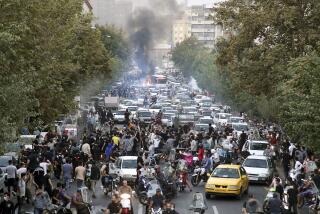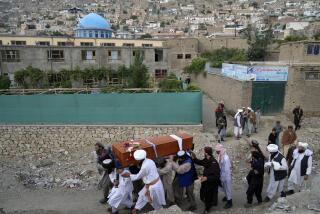Iraq’s Sufi Community Shaken by Deadly Attack
- Share via
BAGHDAD — A deadly attack on a gathering of Sufi Muslims last week has shaken adherents to the mystical brand of Islam, who fear they will be increasingly targeted by puritanical insurgents bent on a widening sectarian war.
Iraq’s Sunni Arab-fueled insurgency has mainly targeted Shiite Muslims and ethnic Kurds along with U.S. forces and members of the government and security forces. The suicide bomb attack Thursday night at a Sufi religious celebration north of Baghdad represents a potentially dangerous expansion of the Iraq conflict.
Most Sufis consider themselves Sunni Muslims and espouse an ideology that they claim transcends Islam’s Sunni-Shiite divide. Sufism, associated in the West with hippies, is generally considered unorthodox and esoteric.
Several Iraqi Sufi leaders said Saturday that hostility to Sufism was typical of the extremist ideology espoused by Jordanian insurgent Abu Musab Zarqawi.
“It’s Al Qaeda thinking that will destroy this country,” said a Baghdad-based sheik of the Rifai Sufi order, who requested anonymity for fear of reprisal.
The strike on a takia, a Sufi house of worship or lodge, in the town of Mazaari killed 10 worshipers and injured 12.
It was the first major attack on Sufis in Iraq in the nearly 2-year insurgency, but adherents in Mazaari and Baghdad said it was an inevitable extension of standing suspicion toward Sufism from Sunni extremists whose ideas have permeated the insurgency.
“All the [Sufi] orders are facing threats,” said the ponytailed guard of a Baghdad takia that is part of the Kasnazani order.
All entry roads to the Baghdad takia were blocked by large blue barrels with plants incongruously growing out of the tops. A crudely constructed concrete wall ringed the large two-story house. The guard, who refused to give his name, said the security measures were put in place a year ago after four mortar shells landed nearby.
Sufis tend to be viewed with a certain bemused suspicion by mainstream Muslims in Iraq and elsewhere, particularly in recent years as Wahhabism, a fundamentalist Islamic doctrine, has spread from the Gulf states. Sufism is banned in Saudi Arabia but is officially recognized and respected in most other states.
Sufis are often deeply devout and ascetic, emphasizing charitable works and a spiritual connection with God through chanting sessions known as dhikr.
The Kasnazani order in Mazaari was holding its regular twice-weekly dhikr session when the bomber struck.
“We were sitting in the garden of the takia reciting religious anthems glorifying God,” said Idris Hamid. His father, the takia’s custodian, and three of his brothers were killed in the blast. “We don’t have any hostilities with any particular side, so we don’t know why this operation took place.”
But the Rifai sheik in Baghdad, who estimated that there were 2 million to 3 million Sufi adherents in Iraq, said he expected the attacks to intensify. He and others blamed the attacks on takfiriyeen -- a catch-all term for Sunni fundamentalists who declare Sufis, Shiites and any other variant on what they consider “pure” Islam, to be kafir, or apostates.
The sheik, a burly man, said he had received threats. Last year, he said, he got a cellphone text message: “Retribution for apostates. Retribution for polytheists. Wait for your day.”
Asked what he and his followers could do to protect themselves in the face of a potentially escalating threat, the sheik grinned and said, “We can complain to God.”
Special correspondent Zaydan Khalaf in Mazaari contributed to this report.
More to Read
Sign up for Essential California
The most important California stories and recommendations in your inbox every morning.
You may occasionally receive promotional content from the Los Angeles Times.













